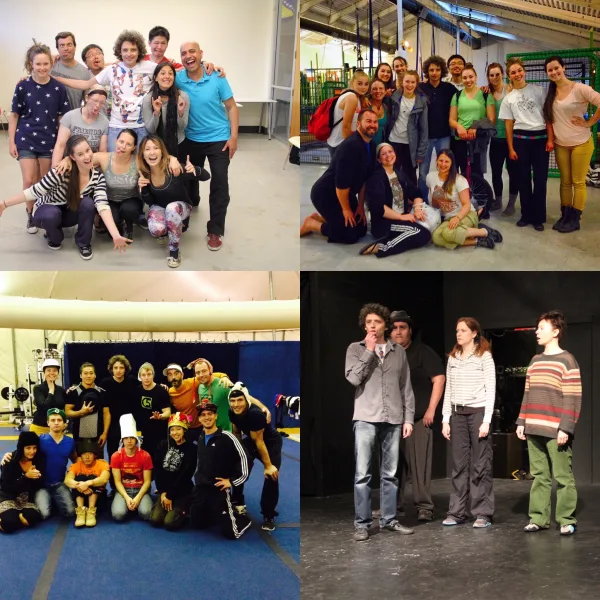Inside Theatre With Mikhail Usov
About
Mikhail Usov has been entertaining audiences since 1983.
In 2009 Mikhail Usov joined Cirque du Soleil to work with writer and director Robert Lepage of Canada; he created a new character called “Fisherman” and performed for Cirque du Soleil’s Totem from its premier in 2010 until 2019. The character will continue to be performed by other artists, with Mikhail as a creator.
From the age of 16, Mikhail has been performing professionally. At 23, he graduated from the prestigious Moscow clown school in Izmaylovo. Soon after graduation, he co-founded MIKOS, which earned the Silver Prize at the 1st International Clown Festival in Moscow. MIKOS performed across Russia and Europe for fourteen years with Mikhail as a creator and principle performer.
As a clown in Europe Mikhail has performed for Wintergarten Variete in Berlin; Tiger Palast in Frankfurt-on Main; GOP-Group, Prinzregentheater in München; Friedrichbau Stuttgart, and Cirque du Soleil. Mikhail wrote two shows: Panopticum and Stadt der Träume (A City of Dreams). Both proved to be a commercial success in Germany with sold out shows for 18 months.
Mikhail won a silver medal at the The World Festival of the Circus of Tomorrow (Festival Mondial du Cirque de Demain) with Cirque D’HIVER BOUGLIONE in 1995. And in July 1999 a gold medal at the International Clown Festival in Ostend, Belgium.
Mikhail performed on The Tonight Show with Jay Leno, Patrick Sebastian and Le Plus Grand Cabaret De Monde on TV5 in France. On German TV, he has appeared on Star in der Manege on TV ARD and ZDF, and ARTE during the Traumtänzer Festival. Mikahil has been featured on BBC London, National TV China, TV in Croatia, and with the Circo Massimo, which creates circus performances to be broadcast across Italy and Europe. Mikhail has also, on three occasions, had the honor of performing at the Royal Albert Hall in London.
Mikhail Usov has the distinction of working along side many creative people in the performing arts such as Robert Lepage (Canada), David Scheiner (USA), Tereza Durova (Russia), Anatoliy Zalevsky (Ukraine)
When Mikhail is not on tour, he lives in California with his family.
ART OF IMPROVISATION.
Registration until August 31.
Acting spontaneously, confidently, unpredictably.
Self- control in any situation.
You will become lighter, higher, simpler, more fun.
We start 12-sessions training in small group from 11 of September.
The Course is designed for 3 months.
We meet every week - one lesson for 90 minutes.
Online Learning will be on the Zoom.
Please join my WAIT LIST we will email you about openings:
https://inside-theatre.com/pages/contact
Being a clown is a very personal experience. For this reason, many clowns are solitary, introspective people.
We are using the quarantine as a unique way to begin your education as a clown with individually-tailored online classes.
As in the Great Depression, the world needs kind and funny clowns more than ever!
I am a professional clown who has been working on stage almost every day for 35 years. I have learned that the CLOWN is not a simple clown nose, oversize shoes, or funny underwear... and I would like to share my practical experience with YOU!
We will discuss individuality, originality, and your own strengths as a person and performer.
My goal is to help you create a unique clown routine or act, as well as to help promote your act on the world's market.
If you are interested, please send me a private message on Facebook or email (*** [email protected] ***)
All the best to you!
Misha
Photos and videos






Reviews
Dal W.
THOMAS F.
Nikita
Frequently asked questions
What is your typical process for working with a new student?
How will the online Course go?
1. The Course is designed for 3 months with 12 Lessons.
2. The Course Meeting is every week - one lesson for 90 minutes
3. Online Learning will be on the Zoom system (with sessions recorded so that you can review).
Mikhail will email you the First Lesson instructions.
or
Join Mikhail's WAIT LIST
If you are on the WAIT LIST, Mikhail will email you about openings.
If you have questions, please contact Mikhail immediately, as the number of Students in classes is limited.
What education and/or training do you have that relates to your work?
In this series of lessons, you will learn how improvisation really works and where it comes from. You will find out what is important to pay attention to, and what you don't need to waste your time on.
How do you learn to improvise?
How do you quickly, elegantly respond to unexpected situations and challenges?
How do you get away with it?
How do you get profit from any circumstance?
How do you make a solution out of a problem?
Improvisation (unexpected, sudden).
Have you heard the saying that the best improvisation is premeditated and rehearsed?
Let's think about the many examples of improvisation by musicians. Especially jazz musicians. Imagine if a pianist could not play the piano. First, he would not be a musician, and second, he would not be able to improvise.
First, he needs to become a musician. Then, he needs to learn to play well. Only after that will he be able to improvise.
We use these same rules in any business or practice.
Let's say we have learned our business well. The next step is to learn how to be spontaneous, unexpected, sudden, or, in other words, how to improvise.
Professional clowns know the secrets of the art of improvisation better than anyone else. Especially street clowns.
The street clown must react to whatever happens with pedestrians, cars, animals, or objects, such as a wind-blown package.
A clown should be a good improviser. But this is not all.
The clown should organize the space, so that from a small part of the street or square, from the gray, boring asphalt, a stage appears. Ordinary pedestrians and onlookers would turn into his audience. He would become an artist for them.
The earnings of a street artist depend on this. That is, in other words, the street clown is not only a clown, but also the seller of his jokes and ideas. The street clown is not only for the audience who come to see him perform, but also for ordinary passersby.
At every performance, clowns come face to face with improvisation.
The success of a clown depends on the ability to improvise.
The real clown is always improvising, no matter what happens.